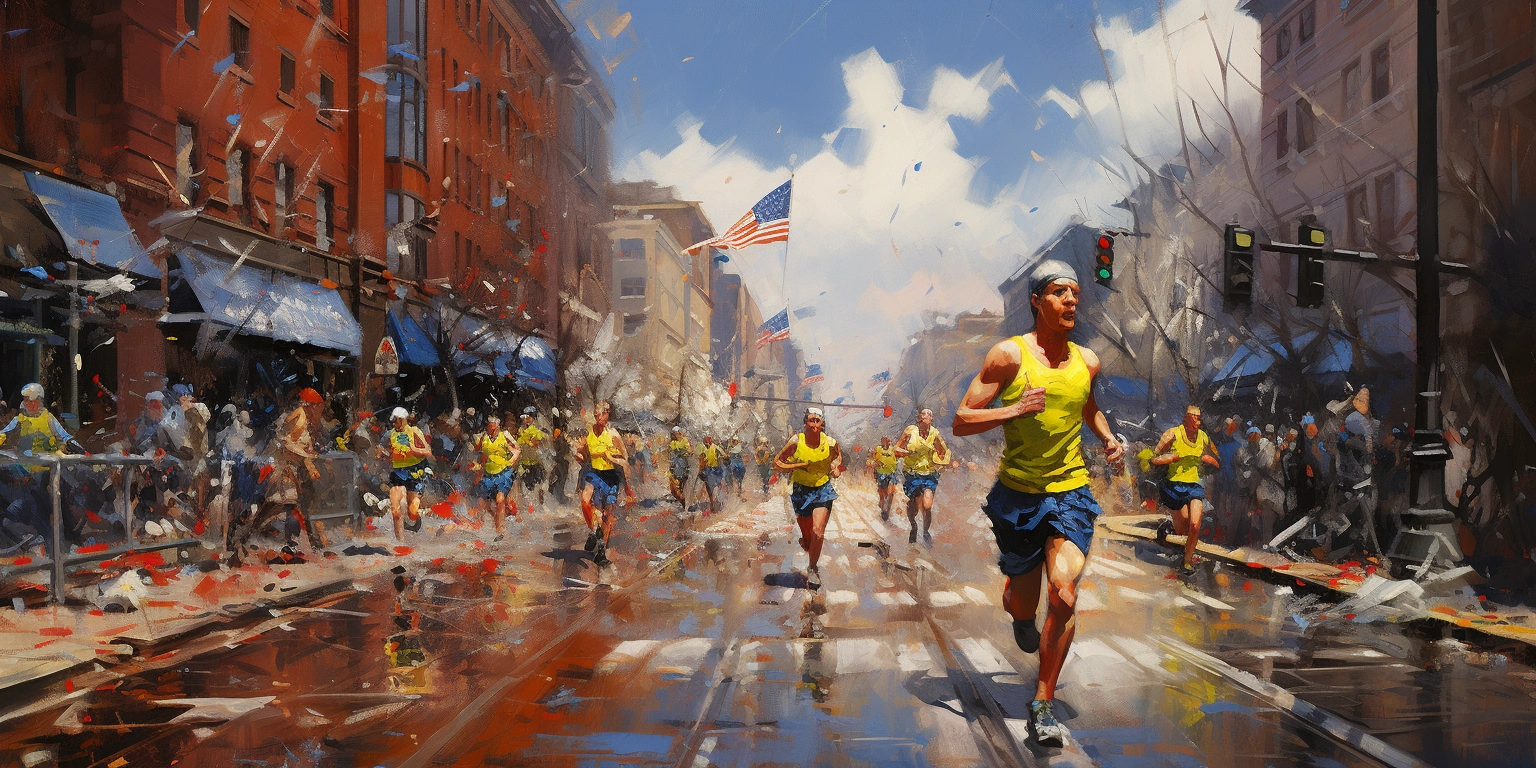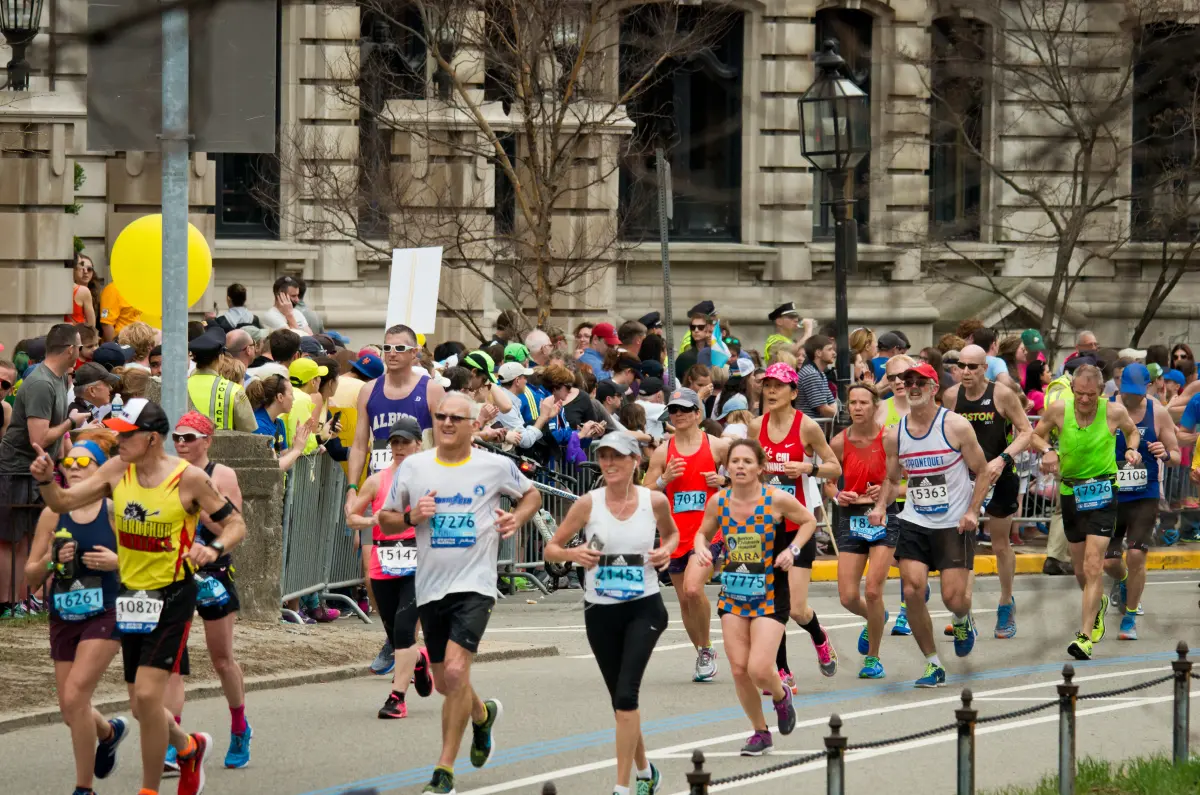Ultimate Guide to Boston Marathon Qualifying Times: Tips for Runners

The Boston Marathon, one of the world's most prestigious races, has a reputation for being a challenging event to qualify for. This guide will help you navigate the complexities of Boston Marathon qualifying times, registration procedures, and race day preparation, providing essential tips and insights to help you achieve your Boston Marathon goals.
You can find the qualifying times for male, female, and non-binary athletes on the Boston Marathon official website. These times vary depending on age and gender group.
Key Takeaways
- Boston Marathon qualifying times are determined by age and gender, with specific standards to ensure fairness across different age groups and competitive selection for the limited race field.
- Qualifying for the Boston Marathon does not guarantee entry due to field size limits; runners must register during the designated period and often need times significantly faster than the minimum standard to be accepted.
- Preparation for the Boston Marathon involves choosing the right qualifying race, following a rigorous training program, securing appropriate gear, and, upon qualifying, understanding the registration timeline and accommodation logistics.

Understanding Boston Marathon Qualifying Times
Earning a spot in the Boston Marathon is a significant achievement. You'll need to meet specific standards based on age and gender and finish a qualifying marathon within a designated time frame. These criteria help maintain the race's competitiveness and fairness among all participants.
Age Group Standards
To qualify for the Boston Marathon, runners must meet specific time criteria, which vary according to their age group. These standards ensure an equitable race across age groups, accounting for the physiological changes associated with aging.
For example, the times required for the 128th Boston Marathon in 2024 remain unchanged from those of 2023. Such consistency enables runners to concentrate on their training, as they know the exact time they need to reach to qualify.
Gender Group Categories
Beyond age, the Boston Marathon, like the London Marathon, subdivides runners into age and gender group categories. Each gender group has specific qualifying times. For instance:
- Men aged 18-34 must achieve a time of 3:00:00
- Women in the same age group must achieve a time of 3:30:00
- Non-binary qualifying times are based on the age group standards.
The Importance of the Qualifying Window
The qualifying window is another crucial element in qualifying for the Boston Marathon. Runners must complete a qualifying marathon within the specified window, which typically covers one year before the September of the marathon year, concluding in mid-September.
This means that to qualify for the Boston Marathon, you must achieve your qualifying time in a certified marathon on or after September 1, 2022.
Navigating the Registration Process
After meeting your qualifying time, the subsequent step is understanding the Boston Marathon registration process. This involves understanding the field size limit, cut-off time, and the timeframe for registration.
Field Size Limit and Cut-Off Time
The Boston Marathon field size limit is determined annually by the Boston Athletic Association (B.A.A.), taking into account overall field size constraints and the race's popularity. With a limit set to accommodate 30,000 racers, this may result in the exclusion of some qualified runners.
If the number of qualified applicants exceeds the field size limit, the B.A.A. accepts only those runners with the fastest times relative to their qualifying standards. This implies that even if you meet your qualifying time, you may not get selected if your time isn't competitive enough. Therefore, achieving a performance significantly below the qualifying time for your age group can improve your chances of gaining entry, as qualifiers who are not accepted will be those with less competitive times.
Guaranteeing Your Entry
Even though meeting your qualifying time is a notable achievement, it does not guarantee participation in the Boston Marathon. The most effective method to ensure admission is to exceed the minimum qualifying time.
Securing an entry via participating charities provides an alternative way to the race.
Marathon Preparation: From Qualifying to Race Day
Having qualified and registered for the race, the next step is to get ready for the main event. This involves selecting the proper qualifying marathon, training effectively, and gearing up for race day.
Selecting the Right Qualifying Marathon
Choosing the appropriate qualifying marathon can significantly influence your likelihood of meeting the Boston Marathon qualifying time. Here are some tips to help you choose the right race:
- Consider races with a high percentage of Boston qualifiers.
- Seek out net downhill courses for speed.
- Consult with a running coach for assistance with your training plan.
Some of the fastest marathons for qualifying for the Boston Marathon are:
- Richmond Marathon
- Baystate Marathon
- Cascade Express Marathon
- Grandma's Marathon
- Ottawa Marathon
- REVEL Big Cottonwood Marathon
- Chevron Houston Marathon
- Chicago Marathon
Meanwhile, the Mesa Marathon, Eugene Marathon, Glass City Marathon, Carmel Marathon, and California International Marathon are considered to have relatively more straightforward qualification criteria for their respective marathon distance.
Training for Success
Meeting your Boston Marathon qualifying time necessitates efficient training. This should include a combination of exercises focusing on speed, hill work, and tempo, as well as rest days, long runs, cross-training, and easy runs. Proper fueling is also crucial during your training regimen.
For a customized marathon training resource, consider an 18-week plan from Hal Higdon, which incorporates a half-marathon race at the midpoint. Alternatively, the Runna training application provides adaptable training plans, including fast-track 12-week alternatives and plans for hilly marathons. Avoid common mistakes such as setting arbitrary goal times, neglecting race day nutrition practices during training, overreacting to bad workouts, and wearing old or ill-fitting shoes.
Gear Up
Appropriate gear is indispensable for marathon training and the race day. This encompasses:
- Running shoes
- Clothing
- Sweat-wicking socks
- A running bra for women
- Before and after gear
- Other suitable apparel
Recommended running shoes for marathon training include:
- Nike Vaporfly Next% 3
- Hoka Rocket X 2
- Cloudboom Echo 3
- Puma Fast-FWD Nitro Elite
- On Cloudstratus 3
- Brooks Ghost
- Asics Superblast
Beyond Qualifying: What Happens Next?
After qualifying for the Boston Marathon, you might be curious about the next steps. This section will cover the timeline for qualified athletes and how the Boston Marathon accommodates non-binary entrants.
Qualified Athletes' Timeline
Once you've met the qualifications for the Boston Marathon, you'll need to follow the qualifying window and carry on with race registration within the specified registration period. Following registration, you'll be issued an official acceptance notification, usually by early December, confirming your participation in the event.
The deadline for submitting applications for the Boston Marathon for qualified athletes was Friday, September 15, 2023, at 5:00 p.m. Eastern Time. Once your qualifying time is approved, you'll be notified of this acceptance and can proceed with your race preparations.
Non-Binary Entrants and Future Races
The Boston Marathon has made notable progress in promoting inclusivity by allowing transgender runners to compete according to their identified gender and providing a nonbinary category for individuals who opt not to enroll in the traditional men's or women's divisions.
Non-binary athletes who have completed a marathon as a non-binary participant within the qualifying window can apply for the Boston Marathon during a specified period.
Maximizing Your Marathon Experience
Participating in the Boston Marathon extends beyond the race itself. It's about the experience, the fellowship, and the event's spirit.
This section will provide tips on enhancing your Boston Marathon experience, from arranging accommodations to embracing the marathon's spirit.
Accommodations and Logistics
It's advisable to secure accommodations for the Boston Marathon as early as possible, ideally about 8 months ahead. It's advisable to book a hotel near the race, with popular options such as the Copley Marriott filling up rapidly.
If you're looking for more cost-effective options, consider hotels outside of Boston, in areas such as Watertown, Waltham, or Quincy. Regardless of where you choose to stay, ensure that your accommodations cater to your needs as a runner. Some hotels, like the Crowne Plaza Hotel Boston in Newton and The Westin Copley Place, offer amenities tailored to runners' needs.
Embracing the Marathon Spirit
The Boston Marathon extends beyond being just a race; it celebrates resilience, determination, and triumph over adversity. To fully embrace the spirit of this iconic event, wear the race colors proudly, connect with fellow runners, and enjoy the camaraderie and energy of the crowd.
Remember, the upcoming Boston Marathon is a testament to the indomitable spirit of the city and its participants, and participating in it is a unique achievement in itself, just like running the Berlin Marathon or the Tokyo Marathon.
Summary
In conclusion, qualifying for and running the Boston Marathon is challenging but rewarding. From understanding the qualifying times to selecting the proper qualifying marathon, training effectively, and embracing the marathon spirit, every step brings you closer to that finish line on Boylston Street. Remember that the journey is just as important as the destination, so enjoy the process and make the most of your marathon experience.
Frequently Asked Questions
What do you have to do to qualify for the Boston Marathon?
To participate in the Boston Marathon, you must achieve specific time standards determined by your age and gender. Good luck with your training!
How many people try to qualify for the Boston Marathon?
In 2023, a record-breaking 33,058 athletes applied for the 128th Boston Marathon, with 22,019 being accepted pending final verification. The Boston Marathon sets qualifying times for various age and gender categories.
How many people applied for the Boston Marathon 2024?
33,058 qualified applications were received for the Boston Marathon 2024, exceeding the official entrant limit of 30,000.
Can you run Boston if you don't qualify?
Yes, even if you don't meet the Boston Marathon qualifying times for your age and gender group, there's still a chance for you to participate. You can run the Boston Marathon as a representative for a member of the Official Charity Program.
What are the existing qualifying times for various age and gender categories for the Boston Marathon?
You can find the qualifying times for male, female, and non-binary athletes on the Boston Marathon official website. These times vary depending on age and gender group.